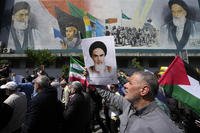The Government Accountability Office has denied Boeing Co.'s protest of the Air Force's decision to award a multi-billion-dollar contract to Northrop Grumman Corp. to develop a next-generation bomber.
The service on Tuesday said the ruling by the GAO, the investigative arm of Congress, came after a "comprehensive review" of the source-selection process, according to an emailed statement from Ann Stefanek, a spokeswoman for the Air Force at the Pentagon.
Air Force Secretary Deborah Lee James said in the statement, "We look forward to proceeding with the development and fielding of this critical weapon system. This platform will offer the joint community the required capability needed to meet our national security objectives and the evolving threat environment. It is important to ensure affordability in this program and the ability to leverage existing technology as we proceed forward."
Air Force Chief of Staff Gen. Mark Welsh added, "The current bomber fleet is aging. The technology advantage the U.S. has enjoyed is narrowing. This new bomber will provide unmatched combat power and agility to respond and adapt faster to our potential adversaries."
During a briefing with reporters, Pentagon Press Secretary Peter Cook said, "From our standpoint, we were confident in the original decision and we think this decision from the GAO reflects that confidence."
A team led by Northrop, maker of the B-2 Spirit stealth bomber and drone aircraft, in October beat out another led by Boeing Co., the world's largest aerospace company, and Lockheed Martin Corp., the world's largest defense contractor, for the $21.4 billion initial contract as part of the Air Force's Long Range Strike Bomber, or LRS-B, program.
Boeing pledged to "carefully review the GAO's decision and decide upon our next steps with regard to the protest in the coming days," according to a statement from Todd Blecher, a spokesman for the the Chicago-based company. "Given the significance of the LRS-B program, it could not be more critical that the government procure the most capable bomber to serve the warfighter, at the greatest value to the American taxpayer."
Northrop, meanwhile, welcomed the decision from the government auditors.
"This confirms that the U.S. Air Force conducted an extraordinarily thorough selection process and selected the most capable and affordable solution," according to a statement from Randy Belote, a spokesman for the Falls Church, Virginia-based company. "The LRS-B is vitally important to national security and we are delighted to be resuming work on the next-generation Long-Range Strike Bomber."
The contract calls for the company to develop the first 21 production aircraft, along with associated engineering and manufacturing work. The planes are scheduled to begin flying in an operational capacity in 2025. The work may eventually be worth more than double the initial contract amount.
The Air Force plans to buy a total of 100 of the next-generation bombers at an inflation-adjusted cost of $564 million per plane to replace its aging fleet of B-52 Stratofortresses made by Boeing Co. and a least a portion of its B-1 fleet.









